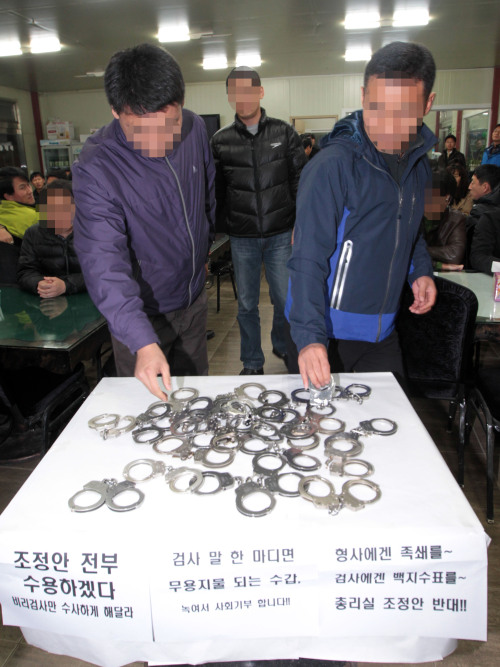Police defiance grows over new rules on investigative rights
By Korea HeraldPublished : Nov. 27, 2011 - 16:50
Police officers step up protests; P.M. Office’s plans draw fire from politicians
Criticism of the modified presidential decree on the criminal investigation procedure, which has caused friction between prosecutors and police over probe rights, is spreading as police officers take drastic measures demonstrating their opposition.
In protest of the planned changes, some police officers have taken part in an event returning handcuffs while a growing number of officers are giving up their posts in investigative branches of the service.
Some 150 civilians and frontline police officers met in Cheongwon-gun, North Chungcheong Province on Friday and Saturday.
At the meeting, law enforcement officers are reported to have expressed willingness to accept the modifications from the Prime Minister’s Office if the police agency were given investigative rights over corruption charges against prosecutors.
The number of police officers giving up investigative positions is skyrocketing with about 70 percent of the 22,000 currently holding such posts doing so by Saturday.
According to the police agency, however, giving up investigative posts will not lead to an immediate lack of a police presence as personnel changes can only occur during the regular reshuffles in June and December.
Criticism of the modified presidential decree on the criminal investigation procedure, which has caused friction between prosecutors and police over probe rights, is spreading as police officers take drastic measures demonstrating their opposition.
In protest of the planned changes, some police officers have taken part in an event returning handcuffs while a growing number of officers are giving up their posts in investigative branches of the service.
Some 150 civilians and frontline police officers met in Cheongwon-gun, North Chungcheong Province on Friday and Saturday.
At the meeting, law enforcement officers are reported to have expressed willingness to accept the modifications from the Prime Minister’s Office if the police agency were given investigative rights over corruption charges against prosecutors.
The number of police officers giving up investigative positions is skyrocketing with about 70 percent of the 22,000 currently holding such posts doing so by Saturday.
According to the police agency, however, giving up investigative posts will not lead to an immediate lack of a police presence as personnel changes can only occur during the regular reshuffles in June and December.

The modified version of the presidential decree on the revised Criminal Procedure Act was drawn up by the Prime Minister’s Office and announced on Wednesday.
According to the modified decree, while police are able to conduct internal investigations or preliminary investigations without direction from the prosecutors, all related evidence and paperwork will have to be submitted for inspection by the prosecutors once a case is closed.
All cases developing beyond the preliminary stage will be conducted according to written directives issued by the prosecutor in charge.
With the modified version effectively making internal investigations by police subject to review by the prosecutor’s office, officers across the country have bombarded the homepages of politicians with posts expressing their opposition.
While the Prime Minister’s Office said that the modifications were made to minimize friction between the police and the public prosecutors, while protecting human rights, the changes met with fierce criticism from the highest levels of the police from the outset.
National Police Agency Commissioner General Cho Hyun-oh said on Wednesday that the parts regarding the police’s investigation procedures “have been changed for the worse,” and that the planned changes “break the organization’s pride and prevent it from fulfilling its functions and duties.”
Voices criticizing the modified decree are not limited to the police force.
“It is right to give full authority over internal investigative processes to the police. The modified version drawn up by the Prime Minister’s Office should be reexamined with regards to this part,” Grand National Party chairman Rep. Hong Joon-pyo was quoted as saying by the party’s spokesperson Kim Ki-hyun.
Rep. Kim Jin-pyo of the Democratic Party has also criticized the proposed modifications saying that they “strengthen the prosecutors’ control over the police,” and that the Prime Minister’s Office sided with the prosecutors in drawing up the decree.
By Choi He-suk (cheesuk@heraldcorp.com)
-
Articles by Korea Herald









![[Hello India] Hyundai Motor vows to boost 'clean mobility' in India](http://res.heraldm.com/phpwas/restmb_idxmake.php?idx=644&simg=/content/image/2024/04/25/20240425050672_0.jpg&u=)









